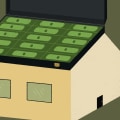Buying a home with cash can be a great way to save money and avoid the hassle of applying for a loan. However, it is important to consider the potential drawbacks of paying in cash before making a decision. Cash buyers may have limited liquidity, may miss out on potential tax benefits, and may be putting too much of their money into a single investment. On the other hand, paying in cash can make your offer more attractive to a seller, can mean lower closing costs, and can provide peace of mind.
Ultimately, it is important to consider your financial situation and long-term investment strategies before deciding whether to pay in cash or finance your home with a mortgage. Paying cash for a house has both advantages and disadvantages. One of the disadvantages of paying in cash is that it limits your liquidity. If you don't have other investments, you may not be able to take advantage of potential opportunities that require additional funds. Additionally, when you pay in cash, you may miss out on potential tax benefits that come with taking out a loan.
For example, when you take out a fixed-interest loan, you can effectively reduce the real cost of your loan by taking advantage of tax deductions. Another disadvantage of paying in cash is that much of your money will be involved in a single investment. Years ago, homeowners sometimes celebrated their final payments with parties that burned mortgages. Today, however, the average homeowner is unlikely to stay in the same place long enough to pay off a 30-year or even 15-year mortgage. In addition, homeowners often refinance their mortgages when interest rates drop, which can extend their credit obligations in the future. On the other hand, there are several advantages to paying in cash for a house.
Being able to pay in cash can make your offer more attractive to a seller. If a seller receives multiple offers, you can pay in cash and others can't, so the seller is more likely to accept your offer. Additionally, paying cash also means no interest and can mean lower closing costs. When you pay in cash, you won't have to deal with lender-related closing costs, which translates into lower closing costs for you. Paying a home with cash and avoiding a mortgage can be a mixed blessing.
Rather than simply looking at it as eliminating mortgage costs, it is important to make the decision based on your financial situation and long-term investment strategies. Paying cash means that if the landlord loses his job, he doesn't have to find a way to pay the mortgage. For many buyers, according to the Wall Street Journal, the peace of mind of not having years of mortgage payments outweighs all other considerations. Ultimately, it is important to consider all factors before deciding whether to pay in cash or finance your home with a mortgage. Cash offers are 97% more likely to succeed and can result in potential savings by making a lower offer or skipping lender fees.
However, it is important to make sure you have enough liquidity and are not putting too much of your money into one investment before making this decision.




